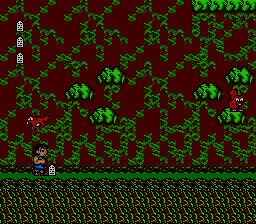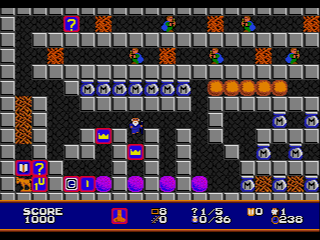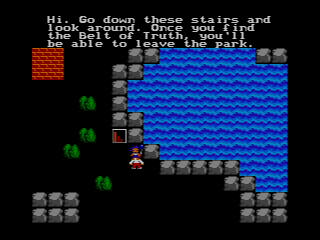The four Bible games for Sega’s wonder console are a mysterious enclave within the Genesis library. There really aren’t any other titles like them for the system.but is that a good thing or a bad thing? Most gamers think they’re either only good for a laugh or they’re pathetic pieces of trash that should be burned immediately. (Probably along with Barney’s Hide and Seek Game.) Not very encouraging.
For a long time now, these games have needed a comprehensive, impartial overview. Not more jaded and ignorant hatred, not a cursory glance before a dismissal, and definitely not blind support. Let’s check out these titles for ourselves, but before we go into the meat of the article, let’s take a look at the company behind these games.
Wisdom Tree
 The story of Wisdom Tree starts with Color Dreams – a company founded by U.S. engineers who developed a program that bypassed the Nintendo Entertainment System’s security features. With its technology, Color Dreams developed games for the NES without the authorization of Nintendo; games like King Neptune’s Adventure, Pesterminator, Metal Fighter, Crystal Mines, and Menace Beach. Then, in 1989, Color Dreams spun off a daughter company called Wisdom Tree. Brenda Huff, co-owner of Wisdom Tree, sums up the purpose of the new company:
The story of Wisdom Tree starts with Color Dreams – a company founded by U.S. engineers who developed a program that bypassed the Nintendo Entertainment System’s security features. With its technology, Color Dreams developed games for the NES without the authorization of Nintendo; games like King Neptune’s Adventure, Pesterminator, Metal Fighter, Crystal Mines, and Menace Beach. Then, in 1989, Color Dreams spun off a daughter company called Wisdom Tree. Brenda Huff, co-owner of Wisdom Tree, sums up the purpose of the new company:
Basically, what we were doing was taking the garbage out and putting Bible content in. That’s the whole reason for the company to begin with. We marketed almost 100 percent into the Christian bookstore market, not through secular channels. It took a while to get in. We got picked up by Focus on the Family, which gave us pretty much of an industry okay.
At first, the concept wasn’t embraced very well by the people at Color Dreams. It grew on them, apparently, as Roger Deforest – one of the programmers at Color Dreams – explains:
It was a concept that had never been explored in video games before…scenarios from the Bible turned into challenging and educational video games. It was quite revolutionary in that aspect. I remember when the owner presented us with the idea of making religious games. He was so excited with his idea. And he convinced us it’d be BIG.
And so Wisdom Tree proceeded to release Christian-oriented titles into the NES market. Their first game was Bible Adventures, which sold 350,000 copies, and after that they published six more, all of which had Bible content instead of the standard “garbage,” as Mrs. Huff puts it. In some cases, Wisdom Tree took the goal of “taking the garbage out and putting Bible content in” quite literally: Sunday Funday was a graphically reworked Menace Beach, and Super 3D Noah’s Ark for the SNES used the maps and engine from Castle Wolfenstein 3D but replaced the Nazis and rocket launchers with goats and bananas.
By the time Wisdom Tree had left the console market and shifted their effort to Christian PC games, they had released seven titles for the NES, four for the Game Boy, one for the SNES, and four for the Sega Genesis. Those games on the Genesis were: Exodus: Journey to the Promised Land (1993), Joshua and the Battle of Jericho (1994), Spiritual Warfare (1994), and Bible Adventures (1995).
Let’s take a look at each one individually.
The Games
Bible Adventures
Man, what can I say? Yeah, this game is good for a laugh or two, but only if you didn’t spend more than about twenty-five cents on it. If you paid more than that for this piece of junk then you’ll just be crying. I paid a dime for it, and even then I could only manage a chuckle or two. This game is so 8-bit nasty that it hurts the eyes. The sprites look like a preschool kid’s doodling (gotta love the bears.they look like woodchucks and are about as big), the ‘animation’ is limited to a few frames or so per character, the backgrounds get about as complex as blue sky with a few clouds, and the sound is so utterly insufficient that you will probably want to mute the television. Frankly, it’s grating on all of your senses.
 The premise of Bible Adventures is decent enough, I suppose. You play one of three different games: Baby Moses, Noah’s Ark, and David and Goliath. In the Moses subgame, you play as the mother of Moses, trying to get through Egyptian territory with your baby in your arms. (Actually you carry him over your head like a sack of wheat, but I digress.) In the Noah’s Ark subgame, you play as the old man himself, collecting the animals to put on the ark. (Those of you who paid attention in Sunday school will recognize the error: the animals came aboard the ark of their own will. Noah didn’t have to go on a gruelingly long roundup.) Finally, in the David subgame you play as, who else, David, but Wisdom Tree doesn’t even give you the pleasure of bashing giants. This one is very similar to the Noah one in that your goal is to collect your sheep and put them in a pen. All of this is done in a pseudo-Mario style side-scrolling game engine, by the way.
The premise of Bible Adventures is decent enough, I suppose. You play one of three different games: Baby Moses, Noah’s Ark, and David and Goliath. In the Moses subgame, you play as the mother of Moses, trying to get through Egyptian territory with your baby in your arms. (Actually you carry him over your head like a sack of wheat, but I digress.) In the Noah’s Ark subgame, you play as the old man himself, collecting the animals to put on the ark. (Those of you who paid attention in Sunday school will recognize the error: the animals came aboard the ark of their own will. Noah didn’t have to go on a gruelingly long roundup.) Finally, in the David subgame you play as, who else, David, but Wisdom Tree doesn’t even give you the pleasure of bashing giants. This one is very similar to the Noah one in that your goal is to collect your sheep and put them in a pen. All of this is done in a pseudo-Mario style side-scrolling game engine, by the way.
The thing is, Bible Adventures can’t even really excuse its problems by branding itself a ‘kid’s game,’ for the simple reason that it’s just too hard for kids. I’ve watched a few of the little people play it on occasion, and-after a few minutes of frustration and confusion-they always switch to something else. It’s easy to tell why. Even the controls have major problems. The character continues to move in whatever direction long after you release the button, and it takes a moment or two for them to jump. You’ll end up careening into lions and bears so much that you’ll gladly stop playing.
The final analysis is that Bible Adventures is so bad that I can only stand in amazement at the fact that the NES port sold 350,000 copies. Not a great reflection on the Christian gaming market, really. I’m a Christian, but I’m not an idiot, and I don’t have a taste for bad games. Because of that, I can only urge you to leave this in the cold, hard, ground. The only possible reason you’d buy this one is if you’re a collector.
Exodus
All right, this is getting better. Much better. Exodus uses a revamped version of the Crystal Mines engine, and anyone who has played that Color Dreams title is sure to see the similarities. Exodus is a far cry from Bible Adventures. Yes, it still has some pretty wimpy art, but at least the ugliness isn’t so big and gaudy anymore. The sound is a bit improved. (Although the music, “Father Abraham,” will drive you insane if you listen to it too long. Make sure to turn it off at the title screen.) Also, Exodus uses a top-down view as opposed to the side-scrolling angle.
The biggest difference, though, is the type of game it is. Whereas Bible Adventures could best be described as a Mario-esque platformer, Exodus is a tile-based puzzle game in the same general vein as Dig Dug. Think of it as a hybrid-the result of a mixture of Bomberman, Dig Dug, and Pac-Man. You play as an adult Moses, wandering mazes full of obstacles, items, and enemies. Your general goal is to find 5 Bible questions and collect a certain amount of gold and silver to pass the level. It sounds so simple, right? He he. Wrong.
Exodus is a collection of 100 diabolically constructed maps that will test your problem solving skills, reflexes, and general puzzle savvy. In my opinion, Exodus (and its sequel, Joshua and the Battle of Jericho) is an incredible game that simply screams of brilliant design. Wisdom Tree crafted a variety of map elements that, when put together in various combinations, create puzzles that are crafty, difficult, solvable, and rewarding all at the same time.
 There are bombs you can lay to clear certain types of obstructions. There are stationary tiles that will kill you if you touch them. There are pickups that will protect you from said tiles. There are tiles that will turn into gold if you blow them up. Some enemies can be killed using a single blast from your weapon (whose projectiles, corny as it is, are the letter ‘w’ for the “Word of God”); other enemies take multiple hits. There are pickups that allow you to walk faster, make you invincible, allow you to tunnel through rocks, increase the range of your ‘weapon’, and keep you safe from explosions. That’s just the tip of the iceberg. And the beautiful, wonderful thing about it all is they combine in such incredible ways. Some of the maps are so ingenious that they must be seen to be believed.
There are bombs you can lay to clear certain types of obstructions. There are stationary tiles that will kill you if you touch them. There are pickups that will protect you from said tiles. There are tiles that will turn into gold if you blow them up. Some enemies can be killed using a single blast from your weapon (whose projectiles, corny as it is, are the letter ‘w’ for the “Word of God”); other enemies take multiple hits. There are pickups that allow you to walk faster, make you invincible, allow you to tunnel through rocks, increase the range of your ‘weapon’, and keep you safe from explosions. That’s just the tip of the iceberg. And the beautiful, wonderful thing about it all is they combine in such incredible ways. Some of the maps are so ingenious that they must be seen to be believed.
So no, it doesn’t look good. No, it doesn’t sound good. And yes, most of the ‘Bible elements’ seem rather contrived and artificially injected. But it has tight controls and gameplay that will make any puzzle enthusiast’s mouth start to water. Be warned, though: an instruction manual is highly recommended for this one because of all the different power-ups and tile types. Another warning of a different type: after every level you have to answer five multiple-choice Bible questions. (You can just tap a button and skip through them, though. It doesn’t really affect your progress.) Some people may find that element offensive or annoying, but just remember that this is a Christian game you’re playing here. What did you expect?
Spiritual Warfare
Not much to say here that hasn’t already been covered in the Exodus review. Spiritual Warfare is a sequel to Exodus, and because of that it has some of the tiles and elements from its predecessor. They did add a lot of new stuff, though. The graphics are much better, and in my opinion the puzzles are as well. It’s the one to get of the two if you’re only purchasing one. Again, a manual is a necessity.
Many people consider this to be the cream of the Wisdom Tree game crop. It’s an adventure game with minimal RPG elements (think Zelda here, folks), and yet again uses another revamped version of the Crystal Mines engine. It’s nothing like that game or Exodus or Joshua, though.
What we have here is a great little title.in its NES and Game Boy incarnations. On the Genesis, though? Joshua was something of an improvement graphically, but this is a step back towards Bible Adventures. The sprites are horribly drawn and have such Spartan animations that you have to look down at the console every once it a while to make sure you’re really playing a Genesis. The sound and music factors are up a little bit, with tunes that aren’t as repetitive as Exodus. (You still might want to mute it after a while, though.)
 As far as gameplay goes, I think that Spiritual Warfare is actually pretty decent. Again, there’s a corny factor as Wisdom Tree bends over backward in order to wedge Christianity into their games, though; you throw Fruit of the Spirit instead of using weapons, enemies become ‘converted’ instead of dying, and you answer Bible questions from an angel with a bow tie (!) for health. But the world is very large and has tons of secrets and hidden items. There are lots of places to go, a handful of nice puzzles to solve, and lots of exploration for everyone. I’m a big fan of hidden areas and large levels, so Spiritual Warfare is pretty satisfactory in that regard. The only bad thing, really, is that it uses a password system instead of a nice, clean save game. In fact, the pass code is so long that it discourages you from playing the game. Personally, I want to get on a game fast and start playing. The one thing I don’t want to do is enter a thirty (or so) digit long code every time I boot up the game.
As far as gameplay goes, I think that Spiritual Warfare is actually pretty decent. Again, there’s a corny factor as Wisdom Tree bends over backward in order to wedge Christianity into their games, though; you throw Fruit of the Spirit instead of using weapons, enemies become ‘converted’ instead of dying, and you answer Bible questions from an angel with a bow tie (!) for health. But the world is very large and has tons of secrets and hidden items. There are lots of places to go, a handful of nice puzzles to solve, and lots of exploration for everyone. I’m a big fan of hidden areas and large levels, so Spiritual Warfare is pretty satisfactory in that regard. The only bad thing, really, is that it uses a password system instead of a nice, clean save game. In fact, the pass code is so long that it discourages you from playing the game. Personally, I want to get on a game fast and start playing. The one thing I don’t want to do is enter a thirty (or so) digit long code every time I boot up the game.
Other than that, there isn’t really anything to keep one from playing Spiritual Warfare, unless you’re one of those types who won’t be satisfied unless a title has killer eye candy. Spiritual Warfare is a pretty good 8-bitish Zelda clone. It certainly isn’t the best top-down RPG you’ll ever play, but its sum is better than its parts. In the end it isn’t so bad at all, and I had quite a bit of fun with it.
Whether you’re a Christian or not, there really isn’t any reason not to play these titles. Masochists of any religion should start tracking down Bible Adventures with a rabid tunnel-vision, puzzlers should do themselves a favor and find Exodus and Joshua, and open-minded RPG-ers/adventure gamers will be able to appreciate many of the elements of Spiritual Warfare.
But what about all the Christianity, you say? Like I said, I’m a Christian, so it doesn’t bother me in the least. That said, though, I can’t really understand why even secular gamers should be turned off. There just isn’t enough Bible content in there to really offend anyone. In that way, I think, Wisdom Tree failed. Their original purpose was to ‘take the garbage out and put Bible content in.’ They did, but the way they artificially injected Bible content-combined with the fact that it’s in such small quantities-makes it easy to pass over or simply ignore it.
In answer to the question “Are they any good?”, they answer is yes.if they are played by the appropriate audience and if they are approached with proper expectations. The games are indeed rather rare, but they aren’t very expensive. With a bit of waiting, you should be able to grab any of the four titles at relatively little cost.
So Where are They Now?
Like I said, Wisdom Tree has shifted its efforts over to the PC. They’ve made twenty-two different computer games over the course of their 16-year existence; titles that range from flight sims (Galilee Flyer), to third-person adventure games (Heaven Bound). Whether or not they’re still in the business, though, is a harder question to answer. Their phone number is dead, they haven’t made a game for a year or so, and it seems as if, after releasing around forty games, they might really be gone.
 If they have indeed folded, then they’ve left the business in pretty much the same condition as they entered it: making games using primitive tools and limited artwork. Wisdom Tree repeatedly used existing engines during their console days (Exodus, Joshua, and Spiritual Warfare all use the Crystal Mines engine, remember), and it takes only a glance to see they still are. Even though they only have a few screen shots up on their website, it’s apparent that they’re using an eighty dollar game engine called 3D Game Studio to make some of their PC games. (Joseph and Galilee Flyer in particular.) Not only that, they’re using the cheapo stock models that come with the program.
If they have indeed folded, then they’ve left the business in pretty much the same condition as they entered it: making games using primitive tools and limited artwork. Wisdom Tree repeatedly used existing engines during their console days (Exodus, Joshua, and Spiritual Warfare all use the Crystal Mines engine, remember), and it takes only a glance to see they still are. Even though they only have a few screen shots up on their website, it’s apparent that they’re using an eighty dollar game engine called 3D Game Studio to make some of their PC games. (Joseph and Galilee Flyer in particular.) Not only that, they’re using the cheapo stock models that come with the program.
In the final review, Wisdom Tree was a company with a lot of heart that had mixed success for a variety of reasons. Horrible art and sound really hurt their games, and they could have incorporated Christianity in a less contrived manner. But at the same time they made a few games that, given half a chance, overcome their setbacks and really shine.
Sources
- Allwein, David. (2004). Wisdom Tree: The History Behind A Religious Game Company. Planetnintendo.com.
- About Color Dreams/Wisdom Tree. AtariHQ.
- Game Info. Wisdom Tree.
- Kent, Steven. (2001). Wisdom Tree Games. The Ultimate History of Video Games. 399.

Recent Comments